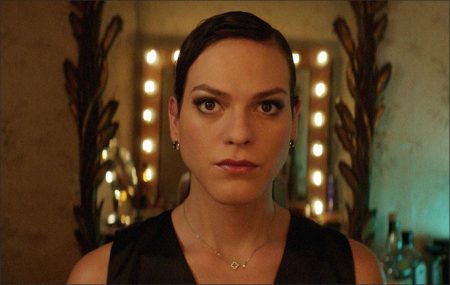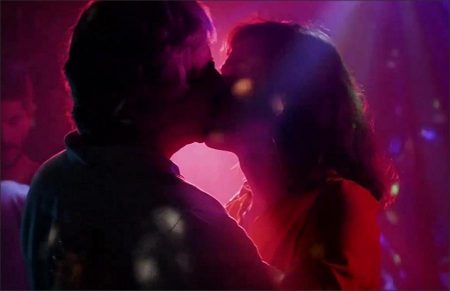
Taglines: Fearless, Powerful, Ravishing.
A Fantastic Woman Movie Storyline. Somewhere in Santiago at a dimly-lit nightclub, Orlando, the kindly and well-off owner of a textile company, locks eyes with Marina, a hopeful singer and the roughly half-his-age love of his life. But, unfortunately, after Marina’s birthday celebration and a night of passion, Orlando falls gravely ill–and by the following morning–he dies in hospital.
In the wake of her companion’s untimely death, Marina will soon realise that, from now on, everything is brought into question: her involvement in Orlando’s death, their unconventional relationship; and above all, her right to mourn her beloved deceased. In the end, what was Marina’s crime; a deed so hideous that would rob a fantastic woman of her respect, her dignity, and ultimately, her identity?
A Fantastic Woman (Spanish: Una mujer fantástica) is a 2017 Chilean drama film directed by Sebastián Lelio. The film premiered at the 67th Berlin International Film Festival on 12 February 2017 where the movie won the Silver Bear for Best Screenplay and the Teddy Award, an award given to films with a LGBT theme. Two days earlier, the film was acquired by Sony Pictures Classics. It was selected as the Chilean entry for the Best Foreign Language Film and was nominated for the Oscar at the 90th Academy Awards.
A Fantastic Woman received critical acclaim upon release. The film currently holds a 90% ‘fresh’ rating on Rotten Tomatoes, based on 67 reviews, with an average score of 8/10. The site’s critical consensus reads, “Subtle and tender, A Fantastic Woman handles its timely, sensitive subject matter with care.”[8] It currently holds a Metacritic score of 89/100, based on 22 reviews, indicating “universal acclaim”.
Film Review for A Fantastic Woman
hen her lover Orlando (Francisco Reyes) suddenly collapses late one night, Marina Vidal (Daniela Vega), a singer and waitress in Santiago, does what she’s supposed to: she loads him into his Volvo and rushes him to the nearest emergency room. After Orlando is pronounced dead, however, having succumbed to an aneurysm, Marina does not linger long. Orlando has a brother, an ex-wife, and an adult son whose attitudes toward Marina—who is significantly younger, of modest means, and transgendered—range from cautious sympathy to choleric disgust, so Marina makes herself scarce.
Still, there’s little reason to presume Marina’s done anything wrong, much less anything criminal or malicious, yet she’s treated as a suspect, a pariah, and a burden rather than as a grief-stricken partner in need of time alone. As Chilean director Sebastián Lelio’s latest film proceeds, Marina is shuttled into a corner, stripped both of her dignity and rightful inheritance, and expected to quietly disappear; instead, she exercises bold defiance and performs a little amateur sleuthing.
She’s a noir heroine—except that noir heroines typically exude fraught passions, troubled pasts, and complicated demeanors, while Marina is essentially an innocent, a victim forced into defense mode. Once the film’s high-tension drama gets underway, she rarely expresses anything other than righteous outrage. Marina suffers many wounds over the course of A Fantastic Woman, but Lelio and Vega never quite get under her skin.
In an earlier era, this sort of melodrama for the marginalized could have provided juicy material for Rainer Werner Fassbinder. In any era, it could have provided Almodóvar with material for a characteristic exercise in fusing camp with emotional depth. (The particular injustices wrought upon Marina recall Patrick Wang’s devastating, woefully underseen 2011 gem In the Family.)
By contrast, Lelio—whose other new film, Disobedience, about an affair between a married Orthodox Jew and another woman (played by Rachel McAdams and Rachel Weisz, respectively), opens this spring—seems less assured in terms of genre, tone, and character development. A Fantastic Woman is, above all, very careful: Marina’s antagonists seldom come off as sheer monsters, while Marina herself is treated with such reverence that she winds up remaining something of a cypher for the film’s duration. She is rather the opposite of the eponymous, gloriously complex heroine of Gloria, Lelio’s 2013 international breakthrough, whom Paulina García imbued with such engrossing nuance and drive.
Where Gloria was active, Marina is reactive; where Gloria found herself on an existential journey, Marina’s sense of identity seems fixed in place. Which is perhaps as it should be, given that to be transgender in contemporary, socially conservative Santiago—as it would be with virtually any city anywhere in the world—demands that a person brace oneself against intolerance and aggression by acting with utter assurance regarding one’s sense of identity. The problem is that such assurance, such a dearth of doubts, flaws, or quirks, doesn’t lend itself to especially compelling or resonant characters. This film’s heart is clearly in the right place, but to plant a marginalized character in the foreground of a narrative is not quite the same as making that character live and breathe.
This isn’t to say that A Fantastic Woman is without satisfactions. Lelio and his cinematographer Benjamín Echazarreta craft a number of visually seductive sequences and capture their numerous locations with an emphasis on urban diversity to mirror Santiago’s veiled yet vibrant diversity of lifestyles.
There’s something inherently worthwhile in watching this story unfold from Marina’s perspective—however limited that perspective may be. One can hope that A Fantastic Woman, with its prestige profile and accessibility, will help keep the gates open for further, richer explorations of the trans experience involving everyday phenomena such as love, death, and the creeping menace of exes and in-laws.
Continue Reading and View the Theatrical Trailer
A Fantastic Woman – Una Mujer Fantástica (2018)
Directed by: Sebastián Lelio
Starring: Daniela Vega, Francisco Reyes, Luis Gnecco, Aline Küppenheim, Nicolás Saavedra, Amparo Noguera, Trinidad González, Alejandro Goic, Antonia Zegers, Sergio Hernández, Diana Cassis
Screenplay by: Sebastián Lelio, Gonzalo Maza
Production Design by: Estefania Larrain
Cinematography by: Benjamín Echazarreta
Film Editing by: Soledad Salfate
Costume Design by: Muriel Parra
Music by: Nani García, Matthew Herbert
MPAA Rating: R for language, sexual content, nudity and a disturbing assault.
Distributed by: Sony Pictures Classics
Release Date: February 2, 2018
Views: 143





